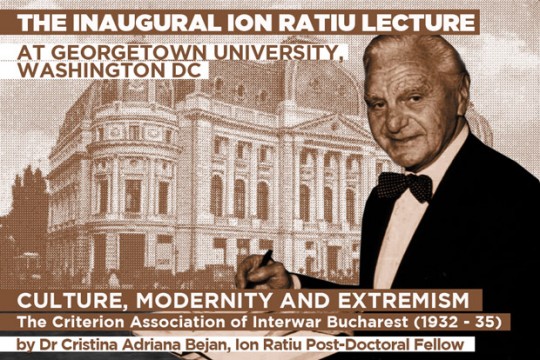 The Ratiu Foundation
The Ratiu Foundation invites you at The Ion Ratiu Chair of Romanian Studies, Georgetown University, Washington DC for the
The Inaugural Lecture at The Ion Ratiu Chair of Romanian Studies
CULTURE, MODERNITY AND EXTREMISM: The Criterion Association of Interwar Bucharest (1932 - 35)
by Dr Cristina Adriana Bejan, Ion Ratiu Post-Doctoral Fellow in Romanian Studies
Center for Eurasian, Russian and East European Studies, Edmund A. Walsh School of Foreign Service
Tuesday 30 November 2010 at 6 pm, Riggs Library, Healy Building, 3rd Floor, Georgetown University, 37th and O Streets, NW, Washington DC (
click here for campus map).
Free entry, RSVP mandatory at ceres@georgetown.edu or using the online form here. Followed by a reception for confirmed guests.
“We considered ourselves adults; we were unwilling to have people shout at us, ‘don’t play with fire!’ – because we knew very well that we were not playing.” – Mircea Eliade, Autobiography Vol I.
“I am overwhelmed by an immense longing for the admirable times of Criterion, which we were cursing [at the time], - and to which we will never return.” - Eugene Ionesco, 1940 letter to Petru Comarnescu
To many the interwar period is Romania’s “Golden Era”. Culture flourished in Bucharest during Romania’s experiment with democracy before the rise of extremism (first fascism, then communism). The 1920s and 30s are easily romanticized given their contrast to the inhumanity Romania suffered for the next half a century. But there were in fact genuine cultural triumphs that deserve to be celebrated not just in Romania but as remarkable contributions to European thought and civilization in the 20th Century. The foremost example of this is The Criterion Association, arguably the pinnacle of interwar Romanian Modernity.
The Criterion Association was an intellectual and cultural society that featured the greatest minds of Romania’s “Young” Generation of 1927 (Mircea Eliade, Petru Comarnescu, Emil Cioran, Eugene Ionesco, Mihail Sebastian, among others). Criterion successfully organized a number of provocative and progressive events: lectures, performances and art exhibitions, as well as a corresponding publication. Eliade considered Criterion to be an existentialist philosophical movement in its own right: the predecessor to Paris’ Left Bank. The way that Criterion functioned itself illustrated the liberal ethos of the time: it operated according to democratic vote by its members.
Criterion dissolved abruptly in 1935 due to the ascension of extremist politics within and outside the intellectual circle, King Carol II’s fear of the organization and a tragic public scandal. This lecture focuses on the activity of Criterion from 1932 – 1935; its successes and the reasons for its untimely demise. From Lenin to Gandhi to American jazz to modernist sculpture, the topics explored in Criterion were as diverse as its membership. Criterion’s activity aptly illustrates that Bucharest’s intellectual elite was grappling with the pressing questions of the time, and was in fact on the forefront of global philosophical, political and cultural trends.
Cristina Adriana Bejan recently completed her DPhil (PhD) at the University of Oxford with a dissertation entitled “The Criterion Association: Friendship, Culture and Fascism in Interwar Bucharest” under the joint-supervision of Regius Professor Robert Evans and Professor Dennis Deletant. She completed her Masters in Modern History and started her doctorate at Oxford as a Rhodes Scholar and conducted much of her research as a Fulbright Scholar at the University of Bucharest. In 2009 Bejan was the Yetta and Jacob Gelman Fellow at the Center for Advanced Holocaust Studies at the United States Holocaust Memorial Museum. In addition to her passion for Romanian culture and history, Bejan is a theatre artist and has contributed to productions as director, playwright or actress in the USA, UK, Romania and Vanuatu. As a playwright, Bejan has written twelve plays and is inspired greatly by the figures she has been so fortunate to study.
The Ion Ratiu Chair of Romanian Studies (IRCRS) at Georgetown University was established by Ion Ratiu in the late 1980s, as a center for research and academic excellence focussing on his native Romania in the city he saw as the capital of the free and democratic world. The Chair’s purpose is to expand knowledge of modern Romanian history, politics, and culture, and to provide the United States’ administration with specialists and resources on Romanian history and current realities. It is the first chair of Romania studies in the world. The endowment of the Ion Ratiu Chair of Romanian Studies was made through a Ratiu Foundation Grant.
Ion Ratiu (1917–2000) was the most outspoken and consistent voice of opposition to Nicolae Ceausescu, whose regime he opposed for years from London as the democratically elected leader of the World Union of Free Romanians. Journalist, broadcaster and author, he was also a successful businessman in shipping and property, while simultaneously operating as a kind of Scarlet Pimpernel, assisting in the rescue of many who fled from Ceausescu’s dictatorship. After fifty years in exile he returned to his homeland in 1990 to contest the presidency. Although he won a seat in Parliament, and was to serve his country for his last ten years, his failure to win the presidency was a disappointment to many. Even nowadays, on Romanian streets, Ion Ratiu is remembered fondly, often referred to as “the best president Romania never had”.
The Ratiu Foundation is a charitable organisation established in 1979 by the leading Romanian dissident and democracy campaigner, Ion Ratiu, and his wife Elisabeth Ratiu. The goals of the Foundation are to further education and research in the culture and history of Romania in particular, and also to stimulate and support civil society in its understanding and application of democracy and democratic principles the world over. Details at www.ratiufamilyfoundation.com
 The Ratiu Foundation invites you at The Ion Ratiu Chair of Romanian Studies, Georgetown University, Washington DC for the
The Ratiu Foundation invites you at The Ion Ratiu Chair of Romanian Studies, Georgetown University, Washington DC for the